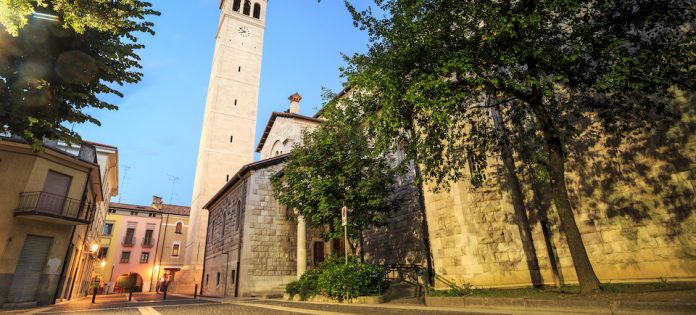by EH
In a closely watched local election that drew national attention, the right-wing League party has retained control of Monfalcone, a small industrial town in Friuli Venezia Giulia, despite a historic challenge from the country’s first all-Muslim candidate list.
The League’s candidate, supported by former mayor Anna Maria Cisint, secured a majority of votes, reaffirming the party’s stronghold in the Friuli Venezia Giulia region. The victory came amid rising tensions over immigration, integration, and the political representation of minority communities.
A Historic Candidacy
For the first time in Italy’s political history, a group of naturalized citizens—primarily of Muslim faith—formed their own independent list to contest the elections. Named Italia Plurale (Plural Italy), the list was headed by Bou Konate, a Senegalese-born engineer and former city councillor. It featured candidates from diverse backgrounds, including workers, small business owners, and professionals originally from Bangladesh, North Africa, and Eastern Europe.
“Our goal was not to create a religious or ethnic bloc,” Konate said in the lead-up to the vote. “We are Italians, and we want to participate fully in civic life.”
Despite gaining visibility, Italia Plurale failed to secure a seat on the city council, though the list’s presence marked a milestone for immigrant political engagement in Italy.
A Town at the Crossroads
Monfalcone, a town of 30,000 near the Adriatic coast, has long been shaped by migration. Roughly one-third of its population is foreign-born, with many residents employed at the nearby Fincantieri shipyard—one of Europe’s largest shipbuilding facilities. The town has become emblematic of both the opportunities and tensions that accompany demographic change.
Over the past decade, debates over religious expression, housing, and public services have grown more pronounced. Policies introduced by Cisint during her previous tenure—such as restrictions on prayer spaces and increased surveillance in immigrant neighborhoods—drew both praise and criticism.
Political and Cultural Backlash
The formation of Italia Plurale sparked immediate backlash from local League officials. Cisint, a prominent figure in the party, denounced the list as an attempt to “create an Islamic enclave” and warned of “parallel societies” forming within Italian cities.
Members of the center-left Democratic Party also expressed discomfort. Diego Moretti, the center-left mayoral candidate, acknowledged the democratic legitimacy of Italia Plurale but criticized its “ethnically defined” composition, arguing that such initiatives risk deepening social divisions.
Election Day Incident Highlights Cultural Frictions
Tensions peaked on election day when a Muslim woman wearing a niqab—a face-covering veil—was temporarily barred from entering a polling station. Electoral officials cited regulations requiring visible identification. The woman was eventually allowed to vote after removing the veil for identification purposes in a private space.
The incident reignited debate over religious freedom and public security, with some legal experts calling for clearer national guidelines on religious attire at polling stations.
A Symbolic Shift
While Italia Plurale did not win representation, analysts say its appearance on the ballot represents a significant moment in Italian politics. “It’s a turning point,” said sociologist Chiara Ferrante of the University of Trieste. “For the first time, a marginalized community has attempted to speak for itself within the formal structures of democracy.”
For many in Monfalcone, however, the election outcome suggests a preference for continuity and caution. The League’s victory reinforces a political narrative focused on law and order, national identity, and controlled integration—an approach that continues to resonate with many voters in the region.





























